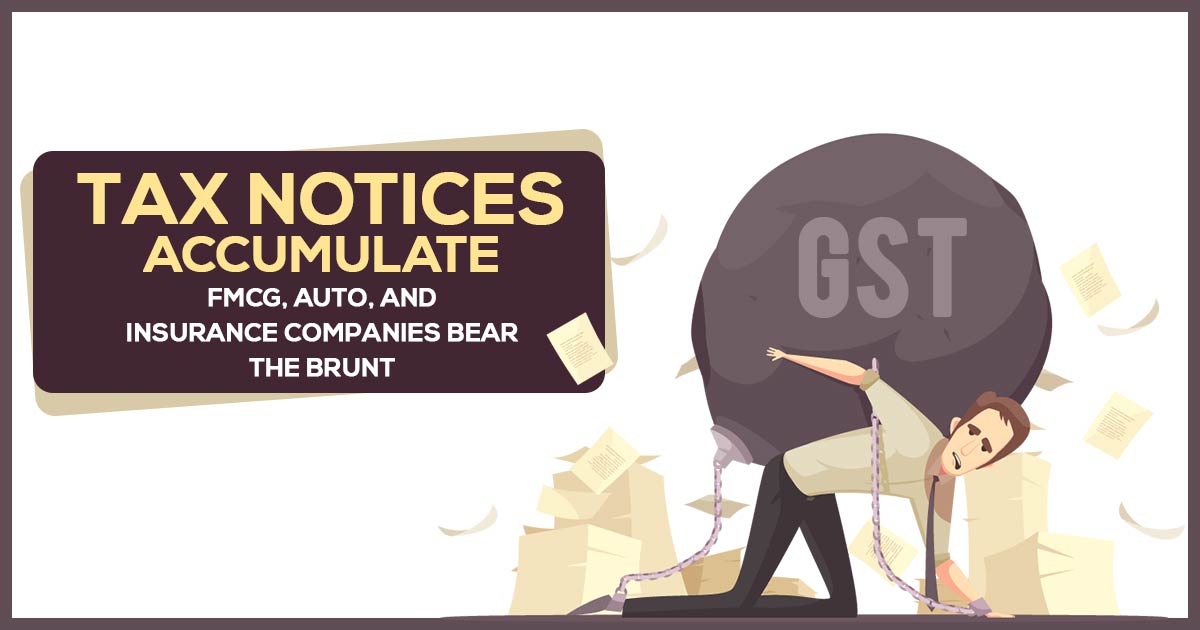
Dabur India joined the growing list of companies that have received tax notices, as the Goods and Services Tax (GST) authorities issued a demand of over Rs 320 crore. Dabur India, a consumer goods company, has stated its intent to challenge this demand with the relevant authorities.
In recent months, a variety of businesses spanning sectors like fast-moving consumer goods, automobiles, mattress manufacturers, and insurance companies have found themselves the recipients of show cause-cum-demand notices from the GST authorities. These notices pertain to issues such as “short payment” of taxes, “wrongful availment” of tax credits, and discrepancies in their returns dating back to the 2017-18 period.
Notably, insurance companies like LIC, Bajaj Allianz, ICICI Prudential, ICICI Lombard, Star Health and Allied Insurance, as well as other entities including Maruti Suzuki, Akzo Nobel, and Sheela Foam, have all been served with GST show cause notices in recent months.
Experts have noted that a surge in these notices has occurred due to the approaching end of the three-year time limitation period for sending notices related to the financial year 2017-18 within this fiscal year. This limitation period commences after the filing of annual returns for the relevant year.
The deadlines for GST annual return filings were subject to multiple extensions, both during the initial implementation phase of GST and later during the COVID-19 pandemic. Consequently, the limitation period for 2017-18 concluded in September of this year. The GST authorities have taken advantage of this deadline to issue a flurry of notices, given that 2017-18 marked the initial year of the indirect tax regime following its introduction in July 2017.
As per the tax expert, it mentions that with the normal limitation period for FY2017-18 approaching, there was a general expectation of notices being issued on this matter. The industry has been assessing the said ruling based on their specific circumstances and is considering the pending matter at the Supreme Court.
Moreover, during the initial phase of GST implementation, there were several challenges, leading to many notices arising from disparities between GSTR-1 and GSTR-3B. GSTR-1 represents sales, while GSTR-3B offers a summary of all transactions, including GST payments and input tax credits.
An unnamed expert further noted, “For cases related to 2017-18 and 2018-19, authorities are currently reviewing responses from companies. However, in instances of repeated discrepancies, they are pushing for the payment of the tax demand and associated penalties.
Service sector companies, in particular, are grappling with a surge of notices from various jurisdictional authorities due to their multiple registrations under GST, which can range from 25 to 30, in contrast to the single registration system in the pre-GST era. As one tax expert noted, “For a service sector company holding registrations in 25 states, it essentially implies engaging in 25 legal battles across different states.”
Experts predict that as these show cause notices continue to evolve into demand notices and appeals in the upcoming months, it signifies the commencement of an extended legal struggle for companies operating under the GST framework.
Dabur India announced its intention to contest the GST demand, citing “strong merits” as the basis for its response and submissions before the relevant authorities.
Read also: More Than 200 Big Brands May Face Tax Demand Under Pre-GST Regime
The company’s statement reads, “The Company has received notification of tax liability under Section 74(5) of the CGST Act, 2017, indicating that the GST amount short paid or unpaid, totaling Rs 320,60,53,069/-, has been advised for payment by the Company, along with applicable interest and penalties under Section 74(5) of the CGST Act, 2017. Failure to comply will result in the issuance of a show cause notice.”
At the beginning of this month, Bajaj Allianz General Insurance (BAGIC), a general insurance company, received a combined show cause and demand notice totalling Rs 1,010 crore from the Directorate General of GST Intelligence located in Pune.
In September, ICICI Lombard General Insurance was served with a demand notice of Rs 1,728 crore by the DGGI for failure to pay taxes on specific supplies made between July 2017 and March 2022. Previously, the government had disclosed that the Directorate General of GST Intelligence, Mumbai Zonal Unit, had initiated investigations into 16 insurance companies regarding their eligibility for input tax credit.









